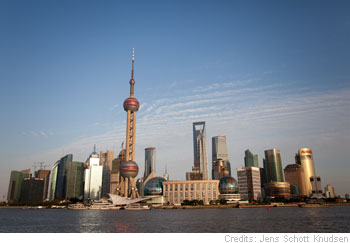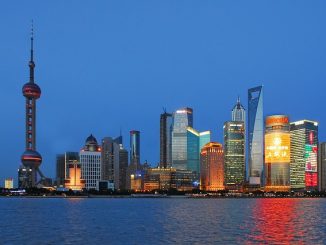 Here is a quotation from a recent article in Forbes:
Here is a quotation from a recent article in Forbes:
China’s mercantilist trade policy is another contributor to its asset bubble. By artificially depressing the value of its currency and making it difficult for locals to invest abroad, China has forced an artificially large amount of capital to chase after domestic investments, inflating property and stock prices. It’s the same scenario China pursued in late 2007, before its stock market lost two-thirds of its value, but that era was characterized by monetary restraint compared with today.
“It’s a pure debt game,” says Andy Xie, an economist who advises private investors and sees the current bubble as “much worse than previous ones.”
In late November China’s ruling Politburo declared that the nation’s monetary and fiscal promiscuity will continue into 2010. The markets, predictably, were overjoyed. Economists who see parallels to the Russian and Brazilian financial crises a dozen years ago are less sanguine.
Let’s see if we can figure out Forbes’ agenda. The 2007 policies of mercantilism blew up a big bubble. And according to Forbes this somehow explains the sharp rise and fall of Chinese stock prices. And what about the fact that stocks also rose and fell sharply in countries that did not pursue mercantilist policies? No answer. And why didn’t stocks stay high? After all, they are still pursuing those policies, aren’t they? Again, no answer.
And how about those “Economists who see parallels to the Russian and Brazilian financial crises a dozen years ago?” Would those be the same economists who (as a whole) failed to predict the Russian and Brazilian crisis (and almost every other economic crisis in world history?) To its credit, Forbes does admit that the record of economists is something less than perfect:
China naysayers have been wrong before. Gordon Chang, author of the 2001 book The Coming Collapse of China, has warned–wrongly, so far–that doom lies around the corner. Cushioning China’s economy is its high growth rate, an estimated $260 billion (but declining) annual current account surplus and, at $2.3 trillion, the world’s biggest foreign exchange reserve.
But the statement that really jumped out at me was “The markets, predictably, were overjoyed,” from the first passage I quoted. Note how the statement is dripping with sarcasm. You’d think it was uttered by someone like Paul Krugman. But no, it was Forbes magazine, the self-styled “capitalist tool.” With friends like Forbes capitalism hardly needs enemies. If Forbes is right, and the markets are made up by a bunch of fools, then why not go with socialism?
Here’s what I think is really going on. The right has a political agenda. When the stock market agrees with that agenda, the Wall Street Journal and Forbes love to cite its response to policy initiatives. For instance, in an earlier post I mentioned how the markets were strongly opposed to Smoot-Hawley, and seemed to favor NAFTA. But when markets don’t agree with the right’s deflationary agenda, suddenly the markets are just as unreliable as a Marxist economist.
You might wonder how I can claim that conservatives favor deflation? Well look at the sentence that preceded Forbes sarcastic dismissal of markets:
In late November China’s ruling Politburo declared that the nation’s monetary and fiscal promiscuity will continue into 2010.
That’s right, even though China has been in the grip of deflation over the past 12 months, Forbes characterizes their monetary policy as “promiscuous.” If it were Playboy magazine that might be a compliment, but in context I am pretty sure Forbes is saying monetary policy is much too expansionary.
Of course this should be no surprise, as the right also thought monetary stimulus was excessive in the early 1930s, even as prices fell sharply. In contrast, those foolish stock investors greeted FDR’s devaluation of the dollar with a huge rally. And of course many voices on the right, some in Forbes itself, have leveled a steady drumbeat of criticism against the supposedly excessive monetary stimulus of the Bernanke Fed over the past 18 months. And again, the markets don’t agree, rather they think that even more monetary stimulus would be helpful. So what does the right do when the markets bring them the message that deflation is not helpful to capitalism, and instead just opens the door to left wing demagogues? They don’t rethink their views. Instead they blame the messenger.
BTW, I have no opinion on where Chinese stock or housing prices are headed. China has always had dramatic ups and downs in its markets, and will continue to do so. China’s overall economy will continue to grow rapidly, with occasional sharp recessions, as in 1990. And just as in every previous recession and bear market, the majority of economists (including me) will fail to see it coming. And as for “overbuilding,” Forbes ain’t seen nothing yet. Over the next 30 years China will construct a mind-boggling amount of new residential and commercial buildings. The comparisons with Japan circa 1990 are just plain silly.
After writing this post I came across two other stories that I thought were worth mentioning. Today’s Wall Street Journal had a scary story about the current debt binge in China. But it also contained a couple odd paragraphs that seemed to undercut their argument:
China’s banks used to be, in effect, lending arms of the government. That led to an enormous pile of nonperforming loans that, by the late 1990s, rendered most state banks technically insolvent. In response, Beijing stripped nearly $200 billion of rotten debt off the banks’ books and injected tens of billions of dollars more in capital. It also pushed the banks to adopt risk-based lending systems, an effort that made major progress in recent years.
But with the economic downturn last year, Beijing told banks to open the credit floodgates. About a quarter of new loans in the first nine months of the year went into infrastructure, but riskier manufacturing and property investments accounted for about 5% each.
So the previous loan fiasco of the late 1990s led to a $200 billion dollar bailout, and was followed by an enormous economic boom. Is that so bad? And will this debt binge be any different? One other question for any China experts reading this: Are those 5% figures misprints? Most of the bubble fears seem related to manufacturing overcapacity and a possible housing bubble. Almost no one thinks China doesn’t need more infrastructure.
Take a look at this link I found on marginalrevolution. In 1994 I took a train to Wuhan—it wasn’t a pleasant trip. They just opened a new 700 mile line between Wuhan and Guangzhou—three hours by train and nearly the distance between NYC and Chicago. Check out all the train stations pictured. Almost every single one is located in an inland city, the ones that American journalists are always telling us are missing out on the great coastal boom. Actually, many of those inland provinces are now growing faster than coastal provinces, and will continue to do so (albeit from a lower base.)
PS. Speaking of China, I got a lot of grief for arguing that the Chinese weak yuan policy helped China recover after March 2009, and that this also helped the world economy. This year’s Chinese trade surplus fell sharply from $295b to $198b, but mostly due to lower Chinese exports. Check out Bloomberg’s prediction for 2010, and the forces that will drive the Chinese trade surplus still lower:
Bloomberg) — China’s trade surplus may slide 19 percent in 2010 as imports surge because of growing domestic demand, Bank of America-Merrill Lynch said.
The amount will narrow to $160 billion from an estimated $198 billion this year, Lu Ting, a Hong Kong-based economist for Merrill, said in an interview today.
A smaller surplus may reduce friction between China, which is poised to become the world’s biggest exporter, and its major trading partners, the commerce ministry said Dec. 16. Disputes with the U.S. or Europe span shoes, tires, screws and the Obama administration’s complaint this week that Chinese plans to foster “indigenous innovation” are erecting a trade barrier.
“The key factor in the narrowing of the surplus will be the increase in imports, driven by rising domestic demand,” Lu said. In 2010, imports may climb 16 percent, outpacing a 9 percent gain in exports, he added, forecasting an economic expansion of 10.1 percent.
Another 16% increase in imports as China continues its “mercantilist” policies.
And then there is this story from today’s Wall Street Journal:
Could a solution to Japan’s economic malaise be just across the East China Sea? While China is a growing rival to Japan, it also looks like one of the best routes to lift Japan out of its malaise.
Already, in 2009, China has displaced the U.S. as the largest overall buyer of Japanese goods, including its top exports: machinery, and electronic goods and parts. It now accounts for nearly one-fifth of Japan’s exports by value.
Being more closely tied to fast-growing China is certainly a welcome development for Japan’s export-reliant economy, which shrank to 2004 levels in the recent financial crisis. Some uncommonly upbeat reports from Japan reflect the shift. Exports to China jumped almost 8% in November from a year earlier, the first increase since September 2008. Those to the U.S., meanwhile, fell by about the same percentage.
UBS estimated earlier this year that a 10% increase in exports to China would add about 0.2 percentage point to Japan’s annual economic growth. Marginal? Not for an economy that has averaged only a bit more than 1% annual growth in the past decade.
To summarize, I keep hammering away at two big China myths. The weak yuan does not hurt the world economy, and thus shouldn’t be discouraged. And China is not a bubble. China may contain all sorts of bubbles (certain property sectors, SOE investment) but China isn’t a bubble. It is a huge growth story that is slowly but surely getting better governance.
- Bulenox: Get 45% to 91% OFF ... Use Discount Code: UNO
- Risk Our Money Not Yours | Get 50% to 90% OFF ... Use Discount Code: MMBVBKSM
Disclaimer: This page contains affiliate links. If you choose to make a purchase after clicking a link, we may receive a commission at no additional cost to you. Thank you for your support!




China faces significant challenges, including an insolvent banking system that must rely on a continuous infusion of capital to function. The 1.3 trillion stimulus accounts for nearly 1/3 of GDP, somewhere inthe range of 20-25% of the stimulus has found its way into either the real estate, stock or commodities bubbles. NPL rates will soar. Already new trust vehicles are being sanctioned as a new vehicle to move defaulted loans off balance sheet, with the added benefit of selling up to 20% interest in the trusts to foreign investors before opening up the product to the accredited investor set.
Cheerleading for china is a joke.
Data collection and reporting is abysmal at the govt and company level. Andy Xie is quite correct to describe this as a massive ponzi scheme of epic proportions.
To say that China’s currency manipulation hasn’t harmed the economies of other nations is ludicrous. It has harmed not only the USA but is harming even other emerging nation economies as well – much has been written on this topic which the author chooses to ignore.
China is imbalancing trade and other economic policies on a global level and China’s uncontrolled desire to dominate the world will eventually cause many economies to collapse.
“China’s mercantilist trade policy” should really read as “China’s mercenary trade war policy”